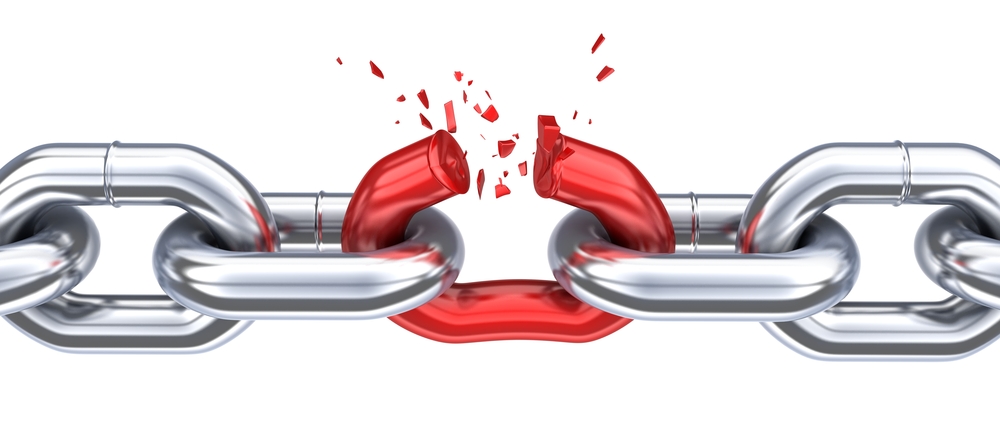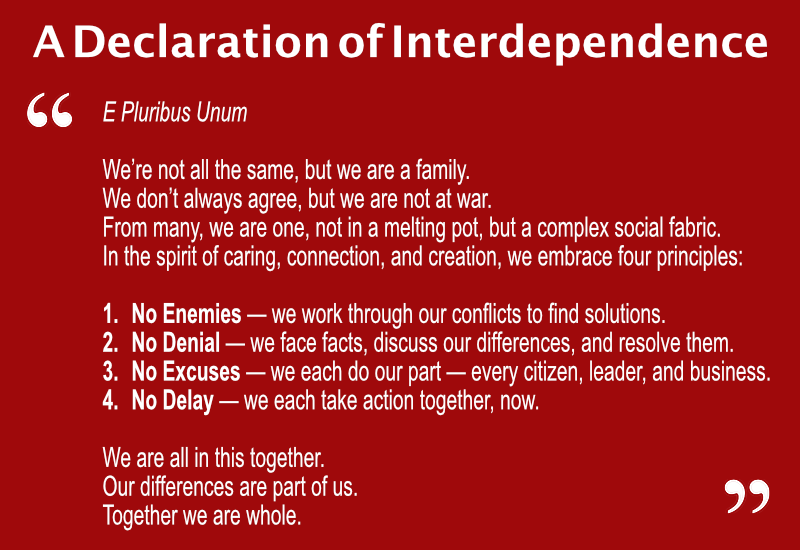In life, there is usually more than one right answer, but there is always a wrong attitude—the unwillingness or failure to collaborate.
As of this writing, the 2020 elections will be here in less than four weeks. While, like most Americans, you’re probably focused on November 3rd, you should be more concerned about November 4th —and beyond. If ‘the powers that be’ cannot collaborate in the coming weeks and months, expect some very rough times.
The ability to collaborate is critical to homo sapiens’ survival (see Harari). And, if we didn’t need to collaborate, we wouldn’t need facilitation. We could survive by obeying someone else’s commands. But that doesn’t work, not in the long run.
Rather than artificial intelligence (AI) or global warming, the stubbornness to appreciate and value our differences, the unwillingness to explore reasons behind our disagreements, and the obstinance to remain inflexible may be our ultimate undoing. Because if we lose our spirit to collaborate, we’ll be dead long before the oceans rise as high as predicted by scientists.
 Unstructured discussions are not working[1]
Unstructured discussions are not working[1]
The world needs structured facilitation more than ever to develop solutions that are owned and shared by ALL stakeholders. A friend of mine in the facilitation profession claims that one of the following three reasons describes all disagreements,[2] either:
- People are in violent agreement with each other. Unfortunately, they define key terms differently—or, they use different terms to define the same thing—and don’t know it, or
- People have different values and can’t agree. For example, an organization that stresses “safety and the principle of no harm” may take a slightly less profitable road in the short run in order to save lives and improve health in the long run. Another organization may not choose safety, preferring the quick win NOW, not later, or
- Some people refuse to collaborate because of age-long animosity that began before they were even born. Goofy. Who cares about the past when our present is being jeopardized and we are facing an impending future with unmanageable hazards, menaces, and risks?
Collaborate and Avoid DoA (Display of Attitude)
I heard recently from Dr. Alphonsus Obayuwana, an expert on ‘happiness’, that at the very least we all share one thing in common—we were all born ‘unhappy’. Thousands of babies were delivered, and this obstetrician never once saw a baby exit the womb smiling. We all begin with a frown, usually accentuated with a cry.
We continue to cry as adults when we don’t get our way. Each of us, at times, is guilty of our own DoA (Display of Attitude) characterized by one of the following characteristics:
- adamant
- bull-headed
- difficult
- headstrong
- recalcitrant
- uncompromising
- uncooperative
- unyielding
Collaborate = Stop Fighting, Start Arguing
People run their lives like they have the only right answer. They forget that words carry more than one definition, or that different words may be used to describe something similar. They lose sensitivity to anything beyond their immediate vision. While different procedures or remedies address each DoA, solutions begin with the attitude and willingness to collaborate.
People need to be challenged to supply evidence, facts, or feelings that justify their unwillingness to collaborate. The best challenges come from a neutral source, a referee of sorts. In meetings, that role belongs to the facilitator.
The facilitator’s first responsibility is to protect participants from harm, perhaps from each other, but not to protect them from their personal reasons for choosing DoA. After protecting participants, facilitators are responsible for challenging every point of view so we can build consensus, beginning with an attitude to collaborate.
 When you collaborate you serve all stakeholders of your community, benefitting the interests of the whole.
When you collaborate you serve all stakeholders of your community, benefitting the interests of the whole.
Recently, I spent a few days with some amazing people and learned about four organizations that, regardless of your political affiliation, you should support or at least tell others about:
- In This Together
- Leadership Now Project
- Future 500
- Bridge Alliance
1. In This Together—PROBLEM-SOLVING, NOT POLARIZATION[3]
Although research indicates that “7 in 10 Americans are ready to solve problems together,” two-thirds of Harvard alumni believe that democracy is at risk. By identifying the biggest fears and deepest prejudices of specific voter segments, strategists can trigger such repulsion of one candidate that voters will readily support the lesser of two evils. This increases voter turnout among those with extreme and hardened ideologies, but divides and marginalizes the 70 percent broad middle — the seven in ten voters who are partisan but pragmatic.
On April 24, the day the US death toll from coronavirus topped 50,000, a dozen billionaire political donors gathered by video with business leaders, foundation chiefs, scientists, advocates, and political strategists, and laid out a bold plan called In This Together, to transform the business of politics. Convened by the Republican conservationist Trammel S. Crow, In This Together intends to reduce political polarization and work across partisan lines to solve problems like climate change.
Objective: To reduce the spend on political warfare and redirect billions toward solutions that unite a governing majority of Americans from the left to right.
“We can’t meet this crisis or any future one as a divided nation,” Crow reminded his guests. “We’re not enemies. We’re a family with differences to work through. Polarization is our real enemy.”
Polarization undermines those who would rather solve problems than sow discord. Additionally, polarization supports candidates beholden to vested interests for dollars and ‘blind-believers’ (extremists) for votes. Thus, constrained by these two forces, bipartisan agreements are mostly off the table.
DoA makes genuine problem-solving difficult and expensive. Consequently, evidence-based reform — protecting climate, improving schools, or preventing pandemics — requires massive investments by foundations and individuals willing to outbid interest groups and offset ideologues to get a fair hearing.
E Pluribus Unum — From Many We Are One.
With brilliant and renowned supporting partners such as Harvard’s Michael Porter, Berkeley’s Bill Shireman, General Colin Powell, and many others, In This Together released their Declaration of Interdependence:
Become part of the Solution by going HERE and Providing Your Assent
Be sure to sign the Declaration for Interdependence, as five million signatures are needed to influence holistic legislation. They currently have two million signees, so your signature is critical.
2. Bridge Alliance Members Need to Collaborate
The Bridge Alliance members have embraced research data, making it evident that 3.5 percent of the people in this country, when demanding or supporting social change, have ALWAYS succeeded (i.e., eleven million USA citizens). The Bridge Alliance represents over one hundred organizations who seek to collaborate and advance healthy self-governance as the United States transitions to a multicultural, pluralistic society over the next two decades, promoting . . .
“ . . . pilot projects will range from facilitator training to practice groups to participation in reviewing policy and engaging with elected officials.”
Aspiring to upgrade our current political system to a modern, democratic republic, The Bridge Alliance members agree to adhere to the Four Principles. Their broad coalition dedicates itself to engaging citizens in the political process, working with civic leaders, and promoting respectful, civil discourse.
Four Principles of The Bridge Alliance
- Collaboration: Our country is stronger when we work together constructively to meet the challenges we face.
- Citizen Voice: Our country is well represented when informed citizens are active in the political and social processes.
- Solutions-focused: Genuine, good-faith problem-solving will lead to the best solutions to address our great challenges.
- Open-minded: We explore and learn from each other, seeking aligned efforts to raise visibility and effectiveness.
The Bridge Alliance organizes planning and tactics around membership categories including:
- Bridging Ideological Divides — 32 Member Organizations
- Facilitating Citizen / Government Interaction — 20 Member Organizations
3. The Leadership Now Project Encourages Us to Collaborate
The Leadership Now Project represents a membership organization of business and thought leaders taking action to remedy American Democracy. Backed by substantial data, analysis, and reports, its founding principles include:
- We must protect democracy while renewing it
- Facts and science matter
- Our economy should work for all today and for future generations
- Diversity is an asset
Leadership Now Project members invest in high-impact organizations and candidates to advance a modern, effective democracy for all Americans. Their priorities for 2019-2021 include:
- Voter participation and protection
- Competitive, fair, and secure elections, particularly through combating gerrymandering and promoting ranked-choice voting
- Data and transparency in politics
- Innovation and ideas for a modern democracy
Today, the Leadership Now Project recommends five concrete actions for businesses to support successful and democratic elections throughout the United States.
- Encourage employees, clients, and consumers to make a voting plan
- Give all employees paid time off to vote on or before Election Day
- Encourage employees to register as poll workers
- Contribute funds to support election operations
- Publicly support a safe and secure election
They also provide a Pledge for Business Leaders for Racial Equity that can be accessed HERE. MGRUSH Facilitation Training has signed the pledge.
4. Future 500
Focusing on sustainability trends, Future 500 is a non-profit consultancy whose core mission build trust between unusual allies––like business leaders, activists, and philanthropists––to advance business as a force for good. They offer companies concrete pointers on how they can minimize risk while finding opportunities to lead the most important social and environmental issues facing the world today.
“We envision a future in which business and civil society work as equal partners and responsible stewards of a clean, just, and prosperous world.”
Their Force for Good Forecast 2020 is available as a one-hour webcast. An organization launched by Bill Shireman, they have an articulate, powerful Theory of Change:
“We believe that forging better relationships is the first step toward solving our most pressing environmental and social challenges. By helping companies and their stakeholders step out of their respective echo chambers and seek common ground in uncommon places, we aim to catalyze innovative, systemic solutions that enable both our planet and society to thrive.”
Collaborate — “You Are Either Part of the Solution or You’re Part of the Problem.” (Eldridge Cleaver)
If we do not collaborate, thus jeopardizing the stability of the USA, we are putting the world at risk. YOU should actively contribute and promote these organizations and their causes while embracing the following sans DoA:[4]
- Facilitate, facilitate, facilitate — volunteer pro bono effort, they need YOU because you can lead structured meetings that deliver clear and actionable results.
- Never forget—“Leaders are motivated by improving the well-being of people, communities, AND the planet in ways that have real, lasting intrinsic value.”
- Always seek to abolish class systems and subject everyone to the same rules of behavior and reward systems
- Share information openly and transparently — no secrets
- Never exclude stakeholders—ensure that ALL groups participate together in planning solutions for changes that affect them
———
If you agree, please like and forward this message to others.
For live and online world-class facilitation training, click HERE to register.
[1] For substantive proof and additional evidence about the negative effects of “lobbying” click HERE
[2] See Michael Wilkinson’s “Secrets,” pg 211.
[3] In This Together: How Republicans, Democrats, Capitalists, and Activists are Uniting to Tackle Climate Change and More.
[4] Strongly influenced by “The New Leadership Paradigm” crafted by Steve Piersanti, President and Publisher of Berrett-Koehler Publishers.

Terrence Metz, MBA, CSM, CSPF, PSP01, HTTO1, is the Managing Director of MG RUSH Facilitation Leadership, Training, and Meeting Design, an acknowledged leader in structured facilitation training, and author of “Meetings That Get Results – A Facilitator’s Guide to Building Better Meetings.” His FAST Facilitation Best Practices blog features nearly 300 articles on facilitation skills and tools aimed at helping others lead meetings that produce clear and actionable results. His clients include Agilists, Scrum teams, program and project managers, senior officers, and the business analyst community among numerous private and public companies and global corporations. As an undergraduate of Northwestern University (Evanston, IL) and an MBA graduate from NWU’s Kellogg School of Management, his professional experience has focused on process improvement and product development. He continually aspires to make it easier for others to succeed.


